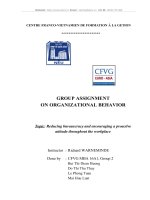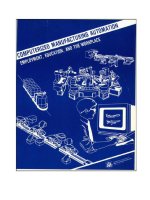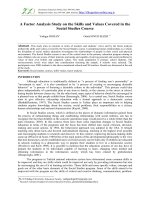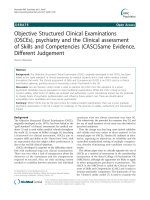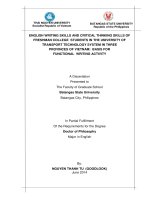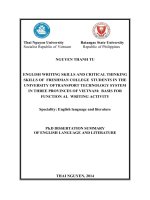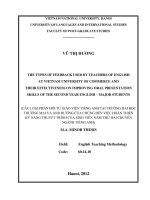Gaming skills and the workplace
Bạn đang xem bản rút gọn của tài liệu. Xem và tải ngay bản đầy đủ của tài liệu tại đây (1.3 MB, 17 trang )
GAME CHANGERS
GAMING SKILLS AND THE WORKPLACE
FLEXIBILITY AND ADAPTABILITY
Literacy Link South Central
Flexibility and Adaptability: Participant Playbook
2
Flexibility and Adaptability: Participant Playbook
This participant playbook is part of a series created for the course “Game Changers: Gaming
Skills and the Workplace.” Built in a modular fashion to allow for maximum flexibility, this
course provides training on real-world skills that can be developed and practiced in a gamebased environment. Using a combination of facilitated lessons, activities, research, and games,
this course will help teach a new generation of job seekers the 21st Century soft skills critical to
Canadian employers. Modules in this course include:
1. Why Gaming is Good
2. Verbal Communication
3. Non-verbal Communication
4. Observation Skills
5. Decision Making
6. Problem Solving
7. Teamwork
8. Flexibility and Adaptability
9. Work Ethic
10. Conflict Resolution
11. Resiliency
12. Who Do You Think You Are?
13. The Employment Game
14. Leveling Up
A Youth Advisory Committee played a key role in the development of this course. Literacy Link
South Central offers thanks to committee members Cassandra Smith, Colin Todkill, Eleyas
Araya, Eric Rice, Jamie Kaill and Taisha Jenee Pinsonneault for their input and guidance.
Gaming recommendations for this project were provided by our advisors at Teleos
Engagement. Literacy Link South Central recognizes Gabriel Hancock, Robert Durant and Shayne
Ganness and thanks them for sharing their in-depth knowledge of game design and
development.
This curriculum was developed and formatted by Summer Burton, Project Manager, Literacy
Link South Central. For questions about this curriculum, please contact Literacy Link South
Central at 519-681-7307 or
Literacy Link South Central is pleased to provide this course through
the support of the Royal Bank of Canada’s Future Launch fund.
3
Flexibility and Adaptability: Participant Playbook
Agenda:
1. The Only Constant is Change
2. 10 Ways to Cope With Big Changes
3. What if change was the only rule?
4. Flexing Your Adaptability Muscles
5. Red 7
6. Selecting the next session’s topic
7. Wrap-up and take-away
4
Flexibility and Adaptability: Participant Playbook
The Only Constant is Change
Things around us are changing – and changing fast – in lots of different ways.
What are some of the changes that have happened recently that impact us and our local
community?
______________________________________________________________________________
______________________________________________________________________________
How have you seen people adapting to those changes? _________________________________
______________________________________________________________________________
What sort of changes do you think you’ll need to adapt to in your lifetime? _________________
______________________________________________________________________________
______________________________________________________________________________
5
Flexibility and Adaptability: Participant Playbook
10 Ways to Cope With Big Changes
Read the article “10 Ways to Cope with Big Changes” and answer the questions below.
Moving past denial and saying to yourself, "Things are changing, and it is okay"
can be less stressful than putting it off.
True
False
It’s important to realize that even _____________ changes can cause stress.
The more change that is happening, the more important it is to have some things that stay the
same, like walking the dog every morning at 8 am. This is referred to as an:
____________________
What is the name of the brain chemical that can get depleted when
you undergo change and as a result, feel stress?
____________________
What’s one way to help us stop binging on carbs or relying on other substances during times of
stress?
______________________________________________________________________________
Exercising _____________________________ has been found to significantly
decrease symptoms of depression.
6
Flexibility and Adaptability: Participant Playbook
No one gets through life alone. It is okay to ______________________.
What sort of positive things may have happened as a result of a big change? _______________
______________________________________________________________________________
What does being proactive mean? _________________________________________________
______________________________________________________________________________
What is one question you can ask to help focus on something other than venting? ___________
______________________________________________________________________________
Two good tips for using social media when you’re going through a big change are to:
1. Make sure you are in a _______________________ when you post—and
keep in mind that whatever you post never really _______________.
2. If you are comparing your life to your friends' lives on social media,
remember that most people post only the "____________________" of
their lives, not the _______________ moments.
Final tips from this article include:
People make _______________. It's _______________ from them that really counts.
Make a point to incorporate more laughter and fun into your life. Laughing increases
_______________, _______________, and _______________. Laughing also decreases
_______________ a stress-producing hormone.
7
Flexibility and Adaptability: Participant Playbook
What if change was the only rule?
When someone wants to become more physically flexible, they stretch – and that’s exactly
what it can take to become more mentally flexible. We need to stretch the boundaries of what
we’re comfortable with now, so they can stretch more naturally in the future.
To help us stretch, we’re going to play a game called Nomic. It’s
not a traditional game – there’s no game board, no cards and no
pieces, just your brains, and a set of die. The rules are simple,
and focus mainly on how players go about changing those rules
beginning with a system of democratic voting. In the game of
Nomic, changing the rules isn’t just a move – it’s the only move.
Review the rules of Nomic on the next page, and play it as a group. As you play, think about the
following questions:
How do the constantly changing rules make you feel? __________________________________
______________________________________________________________________________
Do you find those changes exciting, or frustrating? ____________________________________
______________________________________________________________________________
What rule change had the biggest impact on the game? ________________________________
______________________________________________________________________________
8
Flexibility and Adaptability: Participant Playbook
The Rules of Nomic
1. Play begins with the person whose first name begins with the letter
closest to the end of the alphabet.
2. Play proceeds clockwise.
3. On each turn, players can propose:
a new rule
a change to one of the active rules
that an active rule be removed
4. The rest of the players vote to either accept or deny the proposal. If more than half of the
players vote for the proposal to be accepted, it goes into effect immediately.
5. If more than half of the players vote for the change to be denied, the proposal is
disregarded and the proposing players turn is over.
6. All players begin with 0 points
7. Any player whose proposal is accepted rolls 2 die and adds the total of their roll to their
score.
8. Any player whose proposal is denied rolls 1 die and subtracts the number they roll from
their score.
9. The secretary is responsible for adding, editing, or removing rules from the initial set of
rules as the game progresses.
10. If rules are changed so they directly contradict one another, whichever rule was in place
first takes precedence.
11. The game ends if any player reaches 50 points.
12. If the rules are changed to the point that play can no longer proceed, the last player who
made a proposal that was accepted is declared the winner.
Two rules of Nomic cannot be changed, and are therefore not included in the list of rules
above. The first is that all players must follow all active rules for the duration of the game. The
second is that no rule can be passed that removes players from the game.
9
Flexibility and Adaptability: Participant Playbook
Flexing Your Adaptability Muscles
When people use the word “flexibility,” what are they usually referring to? ________________
______________________________________________________________________________
What is the dictionary definition? __________________________________________________
______________________________________________________________________________
When you think about flexibility in terms of behaviour, how would you describe it? __________
______________________________________________________________________________
Another word we’ve used a few times today is adaptability. It’s related to flexibility, but isn’t
quite the same.
How would you define adaptability? ________________________________________________
______________________________________________________________________________
What is the dictionary definition? __________________________________________________
______________________________________________________________________________
Flexibility has to do with your actions, while adaptability has to do with your reactions.
10
Flexibility and Adaptability: Participant Playbook
Adaptability Self-Assessment
This self-assessment will look at both how you act in the face of change, and how you cope
when changes happen.
Read each of the following 31 statements carefully, and then consider whether you agree or
disagree that it sounds like you. For some of the statements, you may fall somewhere in the
middle – you think the statement is true sometimes but not others. Put a checkmark in the box
that you think is the closest to your real reaction or behaviour.
Disagree
Sometimes
Agree
Score
1. I’m habit-driven, and prefer the
comfort of visiting people and places I
already know
2. I get worried when changes happen
and anticipate that the change will be
hard to handle
3. I get frustrated when I have to change
my plans
4. I see change as an opportunity and
look for ways to take advantage of it
5. I look at things from different points of
view before making a decision
6. I expect something good to come from
change and look for the positive in it as
a result
7. I’ve learned what I need to do my job,
and don’t need to do more than that
8. I take classes that I don’t have to, just
to learn new things
9. I’m interested in moving up to a better
job with more responsibilities
10. I’m comfortable with rearranging my
schedule when new things come up
11. I don’t have a lot of confidence in my
ability to make decisions
12. I’m excited to learn about other
cultures and how they are different
than me
13. If I’m planning something that will
have an impact on other people, I’ll ask
for their input
11
Flexibility and Adaptability: Participant Playbook
14. I’m generally optimistic
15. I have a hard time letting go of past
mistakes
16. I’m an “early adopter” of new
technology and want to try the latest
gadgets
17. I know how to use the technology I
have and won’t upgrade it unless I
have to
18. If I’m in charge, then others can follow
my lead whether they agree with what
I’m doing or not
19. I can admit my mistakes, learn from
them, and move on
20. I help other people figure out how
changes will impact them
21. I recognize my weaknesses and work
to improve
22. When things go wrong, it’s rarely my
fault
23. I find talking to people who think
differently than I do really interesting
24. I’m a “glass half empty” kind of person
25. I usually have a “plan b” in mind just in
case my first idea doesn’t work out
26. I believe there are lots of ways to
accomplish the same task
27. I’d like to spend some time living in
another country with a really different
culture
28. If something I try fails, it really throws
me off
29. I prefer working with people who
share my background and beliefs
30. I believe “if it ain’t broke, don’t fix it”
31. When people express an opinion I
don’t agree with, I try to convince
them they’re wrong
Total
12
Flexibility and Adaptability: Participant Playbook
Where do you fall on the scale? Mark your score on the arrow.
100
0
We can’t control the world around us and that changes are going to happen whether we like
them or not. We can control of our own responses and behaviours when changes happen, and
work towards building the skills we need to handle them well. These 10 Tips for increasing our
flexibility and adaptability can help.
1. Build __________________________, which is the ability to recover from or adjust easily to
misfortune or change.
2. Be _______________________ with ourselves about our reaction to change now. Being clear
about where we start gives us the opportunity to set goals for these muscles we want to
stretch, and see progress as we go.
3. Don’t let __________________________________________________ become a barrier.
4. Be ______________, ask questions, learn new things. What are some ways you can do that?
______________________________________________________________________________
13
Flexibility and Adaptability: Participant Playbook
5. ______________ your boundaries – get out of your comfort zone and stretch a bit. Tip: start
practicing with ‘low stakes’ situations, like changing your route to work, trying new foods, or
listening to music in a genre you normally don’t.
6. Practice your ___________________________________________ skills. Brainstorming
possible solutions is a great way to practice that skill.
7. Find at least one ________________________________________ that could come from
every change. Write down it down and as the change happens, see what you can do to make it
a reality.
8. Be __________________________. Being aware of what’s going on around you can help you
anticipate possible changes and start thinking about how you could react or respond.
Can you think of a time when something changed, and in retrospect you thought “I should have
seen that coming”?
______________________________________________________________________________
9. Find a ________________ who is flexible or good at adapting to change already, and talk to
them.
10. _______________ others deal with or adjust to change. There’s no better way to
reinforce your understanding of something than to try and explain it to other people.
Remember what we said about flexibility – it’s the ability to bend
without breaking. And one of the only ways to do that is to stretch
using techniques like these.
14
Flexibility and Adaptability: Participant Playbook
Red 7
To win the card game “Red 7,” you must have the winning
hand every time you take a turn – if you don’t, you’re out
of the game. To make sure you don’t lose, you’ll need to
change the rules of the game as you go!
What rules can you use?
The Red rules: the player with the highest card wins
The Orange rules: the player with the most of the same number wins
The Yellow rules: the player with the most cards of a single colour wins
The Green rules: the player with the most even cards wins
The Blue rules: the player with the most different colours wins
The Indigo rules: the player with the longest run (ex. 3, 4, 5 and 6) wins
The Violet rules: the player with the most cards valued 1, 2 or 3 wins
Listen as the rules of the game are explained, and prepare to change the rules, and react to
change as play progresses.
Note: This is a competitive game that can be played by between 2 and 4 people. If you don’t
play the game, be sure to watch carefully and make notes below about what you saw. Your
facilitator will ask you to share your observations after the game.
_____________________________________________________________________________
______________________________________________________________________________
______________________________________________________________________________
Question: Did you find all the changes hard to follow, or exciting and engaging?
What was the hardest part, and why?
How quickly did you have to change strategies in the game because of a change in rules?
15
Flexibility and Adaptability: Participant Playbook
Selecting the next session’s topic
We will be discussing another skill from the list during our next session. Each of these skills can
be developed and practiced in a gaming environment, and are important not only in games, but
in a non-gaming environment.
1. Verbal communication
2. Non-verbal communication
3. Observation skills
4. Decision making
5. Problem solving
6. Teamwork
7. Flexibility and adaptability
8. Work ethic
9. Conflict resolution
10. Resiliency
Which skill should we look at next? Participate in the poll to let your workshop facilitator know.
16
Flexibility and Adaptability: Participant Playbook
Wrap-up and take-away
In today’s session we talked a lot about handling changes, especially when they cause stress.
Pick one of the techniques suggested in the article “10 Ways to Cope with Big Changes” and
practice it between now and the next session. Record your chosen technique below – your
facilitator will be asking about this at the start of the next session.
The technique I chose is: _________________________________________________________
Make a note of what you noticed when practicing this technique below:
______________________________________________________________________________
______________________________________________________________________________
______________________________________________________________________________
Reminder: record the date and time of our next session below.
The next session is: ___________________________________ at ____________.
17
